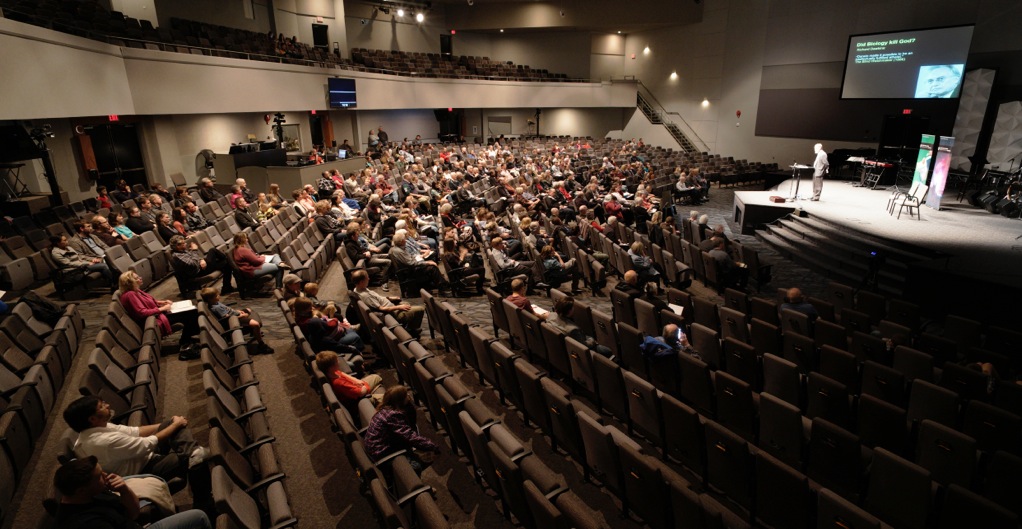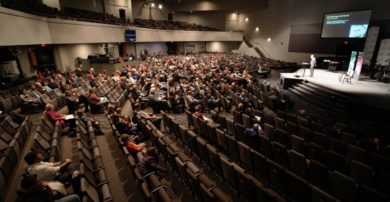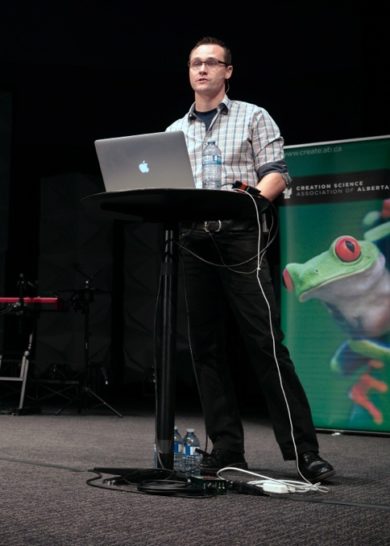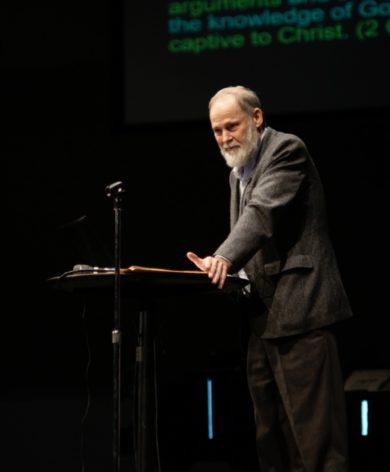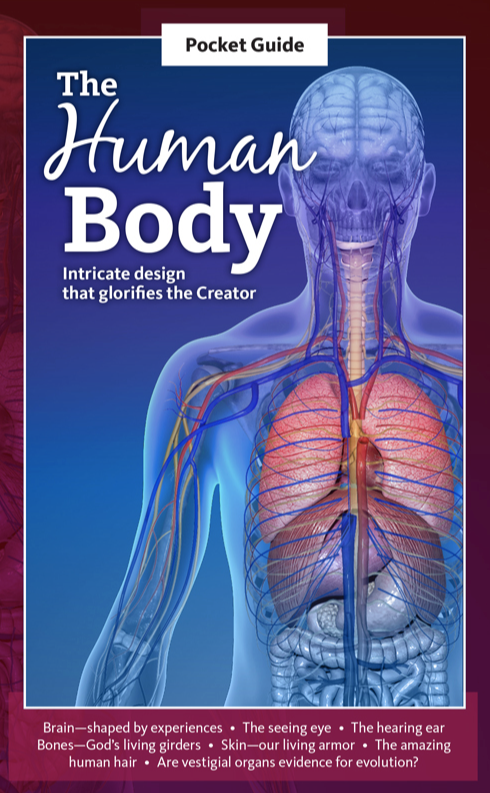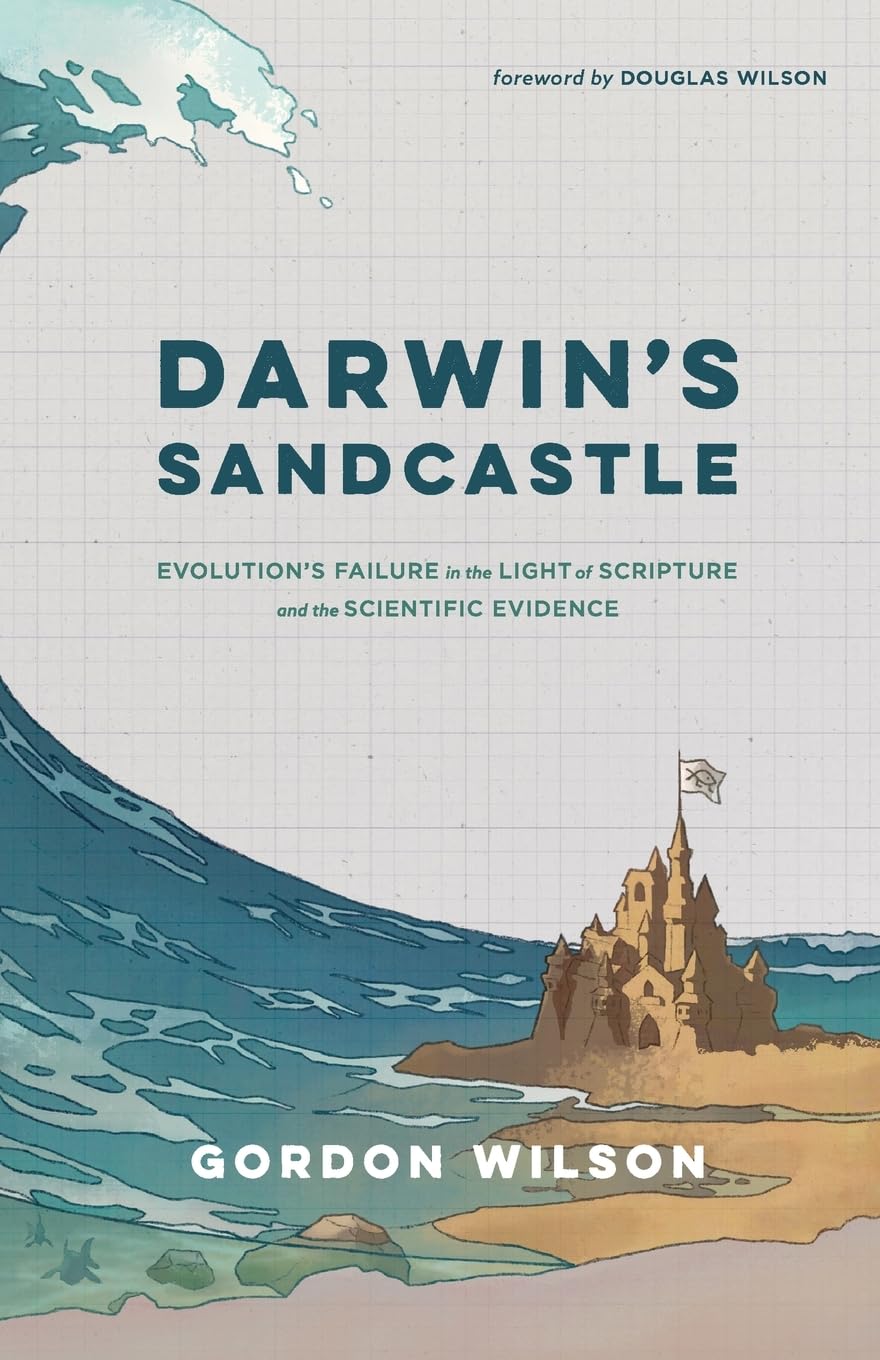The theme of Creation Weekend 2017 was “In Science and Faith, Worldview Matters”. Our speakers Carson Lueck and Dr. John Byl addressed this issue. Many people, in previous years, had indicated in questionnaires that they would be interested in presentations on apologetics. So here we were, considering worldviews. Naturally one might ask “What is a worldview? Why does it matter and how does it apply to our lives?”
John Byl
Dr. Byl, in his second lecture entitled Christian Worldview and Science firstly defined worldview. He declared that a worldview involves fundamental questions of life (such as why are we here?) It consists of presuppositions or assumptions that have to be made up front before any conclusions are drawn. This worldview involves a story or framework which serves as glasses on how we look at the world and evaluate things.
The Christian worldview centres on God, three persons in one, who are sovereign, holy, good and just. This is the key presupposition for the Christian and it contrasts with the secular presupposition that there exists only matter and processes working on matter. Coming from the basic first presupposition, the Christian accepts that God created the physical world and the spiritual world. Accordingly nothing happens by chance. History unfolds according to God’s plan. These views are encapsulated in the Christian view of knowledge which holds that from God we have received the physical world, the Bible and Logic. These views provide the glasses with which we interpret all ideas and all information.
The challenge from mainstream science is the claim that nothing exists except matter and processes. According to this view, the only concepts that are needed to explain why we are here are evolution and long ages. Somehow this view has become connected in the popular mind with the idea that support for the traditional Christian view of a recent creation (as per the book of Genesis), is intellectual suicide. According to such Christian authors as Mark Noll (1994 in The Scandal of the Evangelical Mind) and Bernard Ramm (1954 in Science and Christian Faith) Christians need to support evolution theory if they are to be listened to at all by influential people. This strategy however entails abandoning the Christian worldview since mainstream science categorically rules out any role for God in nature.
What we find is not science versus Christianity but naturalistic explanations versus Christian explanations. The Christian worldview stresses sovereignty of God and the truth of His word. The Christian worldview concerns all aspects of life (culture, morality, man’s relation to nature etc.) The Christian must think Christianly in all disciplines including science. Of course difficulties with the worldview of total materialists such as Ernst Mayr and Jerry Coyne are readily apparent. Dr. Mayr declared in an article in Scientific American (July 2000 vol. 238: 78-83 see p. 80) that laws and experiments are inappropriate techniques for explaining evolutionary past events. Instead, he said “one constructs a historical narrative….” Similarly Dr. Jerry A. Coyne declared in 2003 that “evolutionary biology is a historical science, laden with history’s inevitable imponderables.” (chapter 7 p. 171 in a book edited by Cheryl Brown Travis) In other words evolution theory is full of things that cannot be understood. These prominent evolutionists declared that man has to make up his own origins story. For the Christian alternatively, God is a reliable witness and He has provided us with the creation account, we do not have to make it up.
More problematic for the Christian worldview are scientists who claim a foot in each camp (evolutionary and Biblical). For example, consider theologian Mark Noll who in 1994 declared that support for the creation account of Genesis 1-3 constitutes anti-intellectualism and this is a scandal and a sin. (The Scandal of the Evangelical Mind) Dr. Byl declared that anti-intellectualism is a false issue and that Christians certainly insist that we should use our minds (Mark 12:30). As the apostle Paul declared: “We demolish arguments and every pretension that sets itself up against the knowledge of God…” (2Cor 10:5.)
In keeping with the ideal to use one’s mind, it seems obvious that in science the critical tool for study is observations. If this is so, then observations should always take priority over theory. That is, when observations turn out to be contrary to theories such as evolution, then the theory needs to be discarded. For example, Dr. Byl, in his book God and Cosmos discusses how the theories of events surrounding the Big Bang were modified several times in order to preserve the theory in the face of contrary evidence.
Later in his lecture Dr. Byl listed a number of problems with evolution theory which could/should lead to its rejection. There is no viable mechanism for the origin of information of any kind (such as mathematics). There is no viable explanation for the origin of genetic information. There is no viable explanation for the origin of life, or for consciousness or for cultural attributes of man which cannot be connected with a survival advantage (and the list goes on and on.)
Thus in summary Dr. Byl urged that Christians be very careful to read God’s Word reverently and properly, applying Biblically valid principles of interpretation. The plain reading of Scripture must not be denied by mankind’s inserting modern views onto the text. When the issue pertains to Scripture such as the early chapters of Genesis, we must not imitate the serpent who said “Did God really say?” The apostle Paul warns against knowledge falsely so called (I Tim 6: 20-21) and he contrasts “the foolishness of God” with worldly wisdom (I Cor.1:25) Our worldview will be either God glorifying or God defying. As Christians we need to teach critical thinking which involves Bible knowledge, a discerning attitude and the ability to distinguish between fact and interpretation.
Carson Lueck
The first lecture of the weekend was presented by Carson Lueck, trained in teaching junior high school science. He focused his message especially to youth who all too often encounter science teaching which contradicts the Biblical account. Carson began with two stories of typical young people. The first one rejected his Christian training after he encountered assertions that science has proved the Bible to be wrong. There was nothing to prevent this student from accepting the word of modern scientists in contrast to the Bible authors who were prone (so he believed) to error and the influence of contemporary pagan myths. The other youth approached issues of origins with the view that Scripture has priority and any difficult issues concerning the claims of science can be resolved. The theme of Mr. Lueck’s talk then was that science sits at the feet of Scripture. Naturalism on the other hand produces a story (evolution), that is in complete contrast with what the Bible says. But do not waver, anything that contradicts Scripture, you know that there is an answer for it. You can be confident in Scripture because you know that it is God breathed.
Mr. Lueck proceeded to demonstrate that the Bible provides a unified message, a remarkable fact when one considers that it was composed by many authors over thousands of years. Mr. Lueck then reviewed various Old Testament events which point towards the work of Christ. This speaker began with the protogospel in Genesis 3:15, the promise that an offspring of the woman would restore mankind to a relationship with God. Carson continued that there is nothing in the Old Testament that happened by accident. This history is not something you can ignore or make metaphors about in order to dismiss its significance. Which of us could control 4000 years of history which point to Christ?
According to Mr. Lueck, details in the Bible matter. Nothing can be ignored as irrelevant. For example, the sacrificial system in the Old Testament was established by God to foreshadow the work of Christ, which would be a once-for-all payment for sin. Previously the work of the priests was never completed because their efforts were just an illustration of what was to come. It is interesting, therefore, pointed out Carson, that the tabernacle furniture (despite exhaustive detail) included no chairs. There was nothing upon which the priest could sit because his work was never done. But – according to Hebrews 10:11-12, Christ sat down at the right hand of God, because his work was finished. In like fashion, declared Carson, such obscure details as the presence or absence of a chair is highly significant. The details in all of Scripture are likewise significant. Thus discarding the details of the early chapters of Genesis is clearly very problematic.
Carson then reviewed Christ’s view of the Old Testament. One account that he discussed involved Christ’s declaration that the patriarchs that have died, nevertheless still live with God (quoting from Exodus 3:6 see Matthew 22:31-32 especially “He is not the God of the dead but of the living.” Christ based his argument on the tense of a verb (“I am the God of Abraham ….”). Thus we can see that details in the Bible matter, they have authority. Who among fallible mankind has the right to say that there are any details which we should ignore?
Lastly Carson reviewed the reliability of Bible texts. He declared that God has given us His word and made sure that it has been preserved. No other work from antiquity has as many manuscripts as the Bible and as short a time interval between the original writers and the documents extant today.
Therefore declared Carson Lueck, let us approach all learning confident that we can and must be critical consumers of worldly wisdom. We may not now know the answer to all claims of science, but we have a firm confidence in God and His word. What we must not do, is use science to reinterpret Scripture.
Next issue we will review the other two lectures from Creation Weekend 2017.
December 2017
Subscribe to Dialogue


